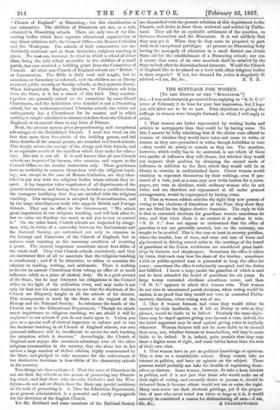THE SUFFRAGE FOR WOMEN. [To THE EDITOR OF THE "SPECTATOR."]
Sxn, —I was unfortunately prevented from replying to " S. D. C.'s" letter of February 2 in time for your last impression, but I hope you will allow me to do so now. Four objections to giving the suffrage to women were brought forward, to which I will reply in order.
1. That women are better represented by writing books and articles in newspapers than they could be by having votes. To this I answer by fully admitting that if the choice were offered to women of whether they would have votes and cease to write, or remain as they are—permitted to write, though forbidden to vote —they would do wisely to remain as they are. The question, however, which really has to be answered, is not which of these two modes of influence they will choose, but whether they would not improve their position by obtaining the second mode of influence in addition to the first, which they would still be at liberty to exercise in undiminished force. Clever women would continue to represent themselves by their writings, even if pos- sessed of a vote, just as a man may now write leaders for a news- paper, yet vote at elections, while ordinary women who do not write, and are therefore not represented at all under present arrangements, would be represented by having votes.
2. That as women seldom exercise the right they now possess of voting at the elections of Guardians of the Poor, they show they are not fitted for the higher elective franchise. The reply to this is that in contested elections for guardians women sometimes do vote, and that when there is no contest it is useless to vote. "S. D. C." does not appear to understand that the office of guardian is not one generally coveted, but, on the contrary, one sought to be avoided. This is the case at least in country parishes, where the trouble, loss of time, and wear and tear of horse and gig incurred in driving several miles to the meetings of the board of guardians at the Union workhouse are considered great hard- ships by farmers and shopkeepers. Sometimes the office is taken by turns, that each may bear his share of the burden ; sometimes a rich or public-spirited man is persuaded to keep the office for years ; sometimes the office is reluctantly accepted, and the duties not fulfilled. I know a large parish the guardian of which is said not to have attended the board of guardians for six years. In large towns contested elections sometimes occur, and then "S. D. C." appears to admit that women vote. That women do not vote in uncontested parish elections, when voting would be useless, is no proof that they would not vote in contested Parlia- mentary elections, when voting was of use.
3. That if women farmers had votes they would either be
coerced by their landlords, or, if left at liberty to vote as they pleased, would be liable to be bribed. Precisely the same objec- tions may be urged against giving men farmers a vote, indeed, the the latter argument may be used against giving votes to anybody whatever. Women farmers will not be more liable to be coerced than men, nor, whether farmers or householders, will they be more liable to be bribed. It is, indeed, quite possible that they may show a higher sense of right, and resist bribes better than the men• of their own class.
4. That women have as yet no political knowledge or opinions.
This is true to a considerable extent. Many women take no interest in politics, and have no opinion on the subject. These persons would probably not take the trouble of registering them- selves as electors. Some women, however, do take a keen interest in politics, and it is not just that those who would make use of their right of voting, and earnestly desire to possess it, should be debarred from it because others would not use or value the right. Many men never use their electoral privilege, yet if the propor- tion of men who never voted was twice as large as it is, it would scarcely be considered a reason for disfranchising all men.—I am,






























 Previous page
Previous page